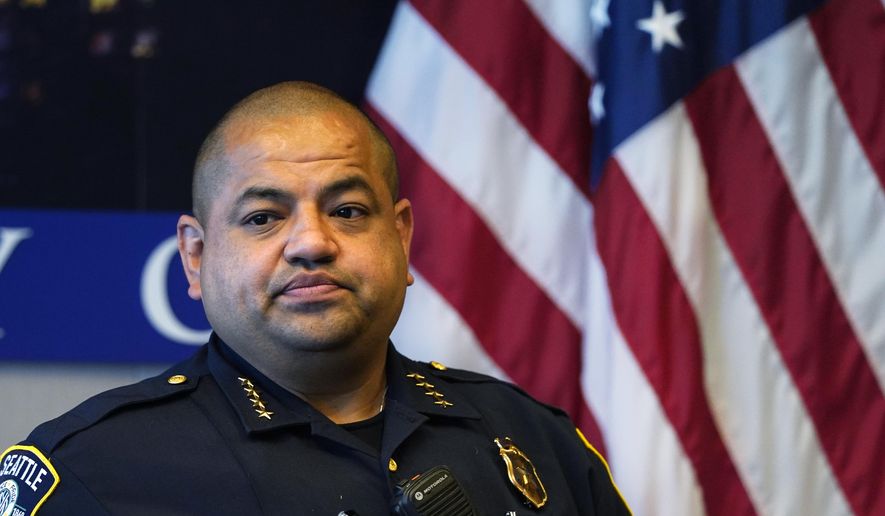President Biden’s offer of $350 billion in federal coronavirus aid to hire more police to fight a national crime surge isn’t the answer for Spokane County Sheriff Ozzie Knezovich.
The sheriff is grappling with a wave of deadly violence and a wave of anti-police sentiment that is scaring off police recruits.
“We have six dead kids since September due to gang violence,” Sheriff Knezovich said of his once quiet community in Washington state.
“You had a summer last year when all of law enforcement got painted with one brush, and young people are taking a very hard look at whether this is what they want to do.”
The stalemate in Congress over Mr. Biden’s proposed racial justice makeover of policing isn’t helping the recruitment problem. Instead, it leaves big question marks over the restrictions and requirements in store for cops on the beat.
“What would really help is to know which way the negotiators are going to end up,” said Jim Pasco, executive director of the National Fraternal Order of Police, the world’s largest organization of sworn law enforcement officers.
Congressional negotiators are discussing ideas to make it easier to sue and potentially collect monetary damages from police officers for their conduct in the line of duty. Lawmakers also are considering national limits on when and how police use force.
As long as those threats linger, Mr. Pasco said, he worries that more veteran officers will retire or resign.
Police departments have suffered a staggering 45% increase in the retirement rate and an 18% increase in resignations in the past year, according to a June survey by the Police Executive Research Forum, an independent think tank studying law enforcement issues.
Pressed by The Washington Times about low police morale and recruitment, White House press secretary Jen Psaki said the president will continue to pursue funding, a crackdown on illegal guns and a racial justice overhaul of law enforcement.
“The president has been clear that he advocates for and supports funding and has proposed funding to ensure that local communities and local police departments have the support and the resources they need,” said Ms. Psaki. “At the same time, he’s also been an advocate and looks forward to signing a police reform bill into law.”
Sen. Tim Scott of South Carolina, the Republican’s lead negotiator in the talks, said last month that Democrats agreed to a framework for a deal that would maintain legal protections for police, which was a major sticking point.
Democrats wanted to strip police of qualified immunity, a legal doctrine that shields government officials and police from lawsuits for violating civil rights while on the job.
The Democratic negotiators, Rep. Karen Bass of California and Sen. Cory A. Booker of New Jersey, have been mum on the deal, and the talks have made no progress for at least three weeks.
Without a national standard, states are stepping in to tighten rules on cops.
Colorado repealed qualified immunity. Other states have widened their definitions of excessive force and banned practices such as chokeholds.
Creating a hodgepodge of state policing laws doesn’t ease the minds of cops wondering whether they should continue to serve, Mr. Pasco said.
The dichotomy between Mr. Biden’s offer of money and police departments’ hiring bind is on display in Spokane.
The county has set aside money to pay for 2,000 police officers but is 40 officers short because of retirements, resignations and a lack of recruits.
Sheriff Knezovich said he can’t find recruits when police officers are labeled as racists and thugs. “How do I get a young person of color to join us?” he asked.
Despite the debate over qualified immunity, the vast majority of police officers would not have to pay damages because they are indemnified by their departments.
A 2014 study in the NYU Law Review found that police departments paid 99.98% of the damages against officers for civil rights violations.
The study examined records covering 2006 through 2011 from 44 of the biggest state and municipal law enforcement agencies and 37 small and midsized agencies.
Even liberal Seattle pays for damages if police officers are sued for acting “in the scope and course of their City employment.”
Still, the issue is on police officers’ minds.
“That’s a concern for every officer. Do I have protection when I act in good faith?” said Seattle Police Chief Adrian Diaz. “Will the city provide coverage of the lawsuit?”
Chief Diaz said he has officers with engineering degrees. Some are lawyers. Others even have doctorates in philosophy.
There are a lot of other jobs his officers could do if they don’t feel Congress and the nation have their backs, he said.
When the death of George Floyd spurred nationwide calls to “defund the police,” 267 Seattle officers quit.
Some came back as the talk quieted, but it left the police department so short-staffed that Chief Diaz had to declare 150 days last year as “priority status days.” Officers were ordered to respond only to the most serious calls.
“If you call to report a burglary, you’re going to be waiting,” he said. “It’s not a good feeling.”
• Jeff Mordock contributed to this report.
• Kery Murakami can be reached at kmurakami@washingtontimes.com.




Please read our comment policy before commenting.